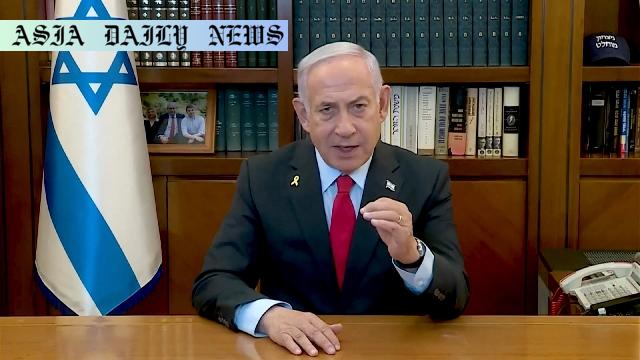Hostages: Israeli PM Netanyahu threatens to end ceasefire as Hamas delays hostage release while accusing Israel of violations.
Israeli Prime Minister Netanyahu threatens to end ceasefire if hostages aren’t freed.
Hamas delays hostage releases, citing Israeli ceasefire agreement violations.
US President Trump pressures Hamas to fulfill hostage release terms.
Tensions escalate over mutual allegations between Israel and Hamas.

Introduction to the Hostage Crisis
The fragile ceasefire agreement between Israel and Hamas appears to be on the brink of collapse, as tensions continue to mount over the delay in the planned release of hostages by Hamas. Israeli Prime Minister Benjamin Netanyahu has issued a stern ultimatum that the ceasefire, currently in place since January 19, will end if the hostages are not freed by noon on Saturday. These developments have plunged the already volatile situation in the Gaza Strip into further disarray.
The Core of the Conflict: Hostages
The hostage issue lies at the center of the breakdown. While Hamas accuses Israel of violating the ceasefire by carrying out attacks and failing to ensure humanitarian aid reaches Gaza, it has announced a delay in the scheduled release of Israeli captives. On the other hand, Israel claims to have abided by the terms of the agreement and views the delay as a breach of trust. This standoff illustrates the fragile dynamics and mutual distrust that continue to define the Israeli-Palestinian conflict.
Netanyahu’s Tough Stand
Prime Minister Netanyahu has remained unwavering in his demands. In a cabinet meeting on Tuesday, followed by a formal statement, he emphasized that Israel’s military forces are prepared to resume intensive combat operations if hostages are not released promptly. The possibility of resuming aggressive military action underscores the urgency and severity of the hostage situation in Israel’s strategic calculations.
Hamas’ Response and Accusations
In response, Hamas officials have blamed Israel for the current impasse. The group has alleged that Israel violated the ceasefire terms by attacking Palestinian residents in Gaza and neglecting its commitment to fully facilitate humanitarian aid deliveries. A Hamas spokesperson reiterated that threats and intimidation from Israel—or even from the US—would not expedite the release of hostages and insisted on addressing Israel’s alleged ceasefire violations first.
Global Implications and the Role of the US
The hostage crisis has stirred international reactions as well. US President Donald Trump took a firm stance, declaring on Monday that he would “let hell break out” if the hostages were not released as per the agreed schedule. This statement amplifies global pressures and underscores the high stakes of this diplomatic and humanitarian crisis. The international community continues to tread cautiously, with divided opinions on how best to mediate this sensitive situation.
The Broader Context of the Ceasefire
The ceasefire, which came into effect on January 19, was a glimmer of hope in the severely battered Gaza Strip. However, the agreement has always been tenuous, marred by allegations of violations and a lack of mutual trust. Both sides see the hostage negotiation issue not merely as a humanitarian matter but also as a strategic leverage point in their long-standing conflict.
A Path Forward?
The Israeli-Hamas conflict has seen numerous episodic escalations, often triggered by deeply rooted grievances and unaddressed political realities. The current crisis over hostages highlights broader questions about the feasibility of peace negotiations, the role of international mediators, and the long-term implications for both Israeli and Palestinian communities if such crises persist. Sustainable solutions require not only immediate negotiations but also addressing the systemic drivers of this enduring conflict.
Conclusion
The worsening scenario in Gaza over the delayed hostage release sheds light on the fragile state of the ceasefire and the broader Israeli-Hamas conflict. With threats, accusations, and ultimatums escalating on both sides, the humanitarian toll promises to grow unless decisive action is taken soon. The global community, particularly influential players like the US, face a critical challenge in mediating this escalating issue, ensuring humanitarian needs, and fostering a longer-term vision for peace in the region.
Commentary
The Fragile Nature of Ceasefires
The precarious state of the ceasefire between Israel and Hamas underscores how fragile agreements can be in deeply divided conflict zones. While the ceasefire came as a relief to many, its sustainability was always contingent on mutual trust—a rare commodity in this decades-long conflict. The hostage situation acts as both the literal and symbolic representation of what happens when negotiations falter and trust erodes.
Hostages: A Political and Humanitarian Issue
Hostages are not just pawns in a political power play—they are individuals whose lives hang in the balance. While Israel and Hamas both use the situation to paint the other as untrustworthy, the human cost is immeasurable. Families of hostages, both in Israel and Gaza, continue to suffer, caught between the rhetoric of revenge and diplomacy.
US Pressure and Potential Fallout
President Donald Trump’s strong remarks add another layer of complexity to the situation. While his fiery rhetoric may aim to pressure Hamas, it also risks escalating the conflict further. Diplomatic channels remain a better suited path for de-escalation, especially in a region already facing unrelenting conflict and humanitarian crises.
A Need for Long-Term Solutions
Ultimately, the current standoff signifies a deeper need for a peace process far beyond immediate crises like hostage releases. Both Israelis and Palestinians need sustainable security and independence to coexist peacefully. For now, the international community must rise to the occasion, mediating to ensure that humanitarian and diplomatic avenues remain open and effective—but also work toward addressing the underlying causes of such recurring conflicts.


